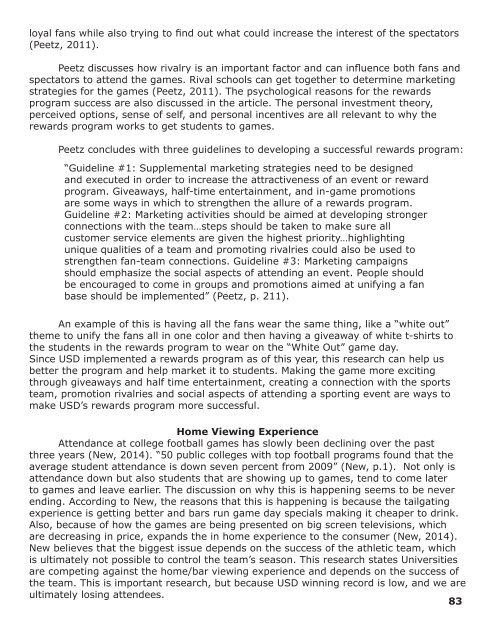CONSULTANTS
You also want an ePaper? Increase the reach of your titles
YUMPU automatically turns print PDFs into web optimized ePapers that Google loves.
(Peetz, 2011).<br />
<br />
spectators to attend the games. Rival schools can get together to determine marketing<br />
strategies for the games (Peetz, 2011). The psychological reasons for the rewards<br />
program success are also discussed in the article. The personal investment theory,<br />
perceived options, sense of self, and personal incentives are all relevant to why the<br />
rewards program works to get students to games.<br />
Peetz concludes with three guidelines to developing a successful rewards program:<br />
“Guideline #1: Supplemental marketing strategies need to be designed<br />
and executed in order to increase the attractiveness of an event or reward<br />
program. Giveaways, half-time entertainment, and in-game promotions<br />
are some ways in which to strengthen the allure of a rewards program.<br />
Guideline #2: Marketing activities should be aimed at developing stronger<br />
connections with the team…steps should be taken to make sure all<br />
customer service elements are given the highest priority…highlighting<br />
unique qualities of a team and promoting rivalries could also be used to<br />
strengthen fan-team connections. Guideline #3: Marketing campaigns<br />
should emphasize the social aspects of attending an event. People should<br />
be encouraged to come in groups and promotions aimed at unifying a fan<br />
base should be implemented” (Peetz, p. 211).<br />
An example of this is having all the fans wear the same thing, like a “white out”<br />
theme to unify the fans all in one color and then having a giveaway of white t-shirts to<br />
the students in the rewards program to wear on the “White Out” game day.<br />
Since USD implemented a rewards program as of this year, this research can help us<br />
better the program and help market it to students. Making the game more exciting<br />
through giveaways and half time entertainment, creating a connection with the sports<br />
team, promotion rivalries and social aspects of attending a sporting event are ways to<br />
make USD’s rewards program more successful.<br />
Home Viewing Experience<br />
Attendance at college football games has slowly been declining over the past<br />
three years (New, 2014). “50 public colleges with top football programs found that the<br />
average student attendance is down seven percent from 2009” (New, p.1). Not only is<br />
attendance down but also students that are showing up to games, tend to come later<br />
to games and leave earlier. The discussion on why this is happening seems to be never<br />
ending. According to New, the reasons that this is happening is because the tailgating<br />
experience is getting better and bars run game day specials making it cheaper to drink.<br />
Also, because of how the games are being presented on big screen televisions, which<br />
are decreasing in price, expands the in home experience to the consumer (New, 2014).<br />
New believes that the biggest issue depends on the success of the athletic team, which<br />
is ultimately not possible to control the team’s season. This research states Universities<br />
are competing against the home/bar viewing experience and depends on the success of<br />
the team. This is important research, but because USD winning record is low, and we are<br />
ultimately losing attendees.<br />
83


